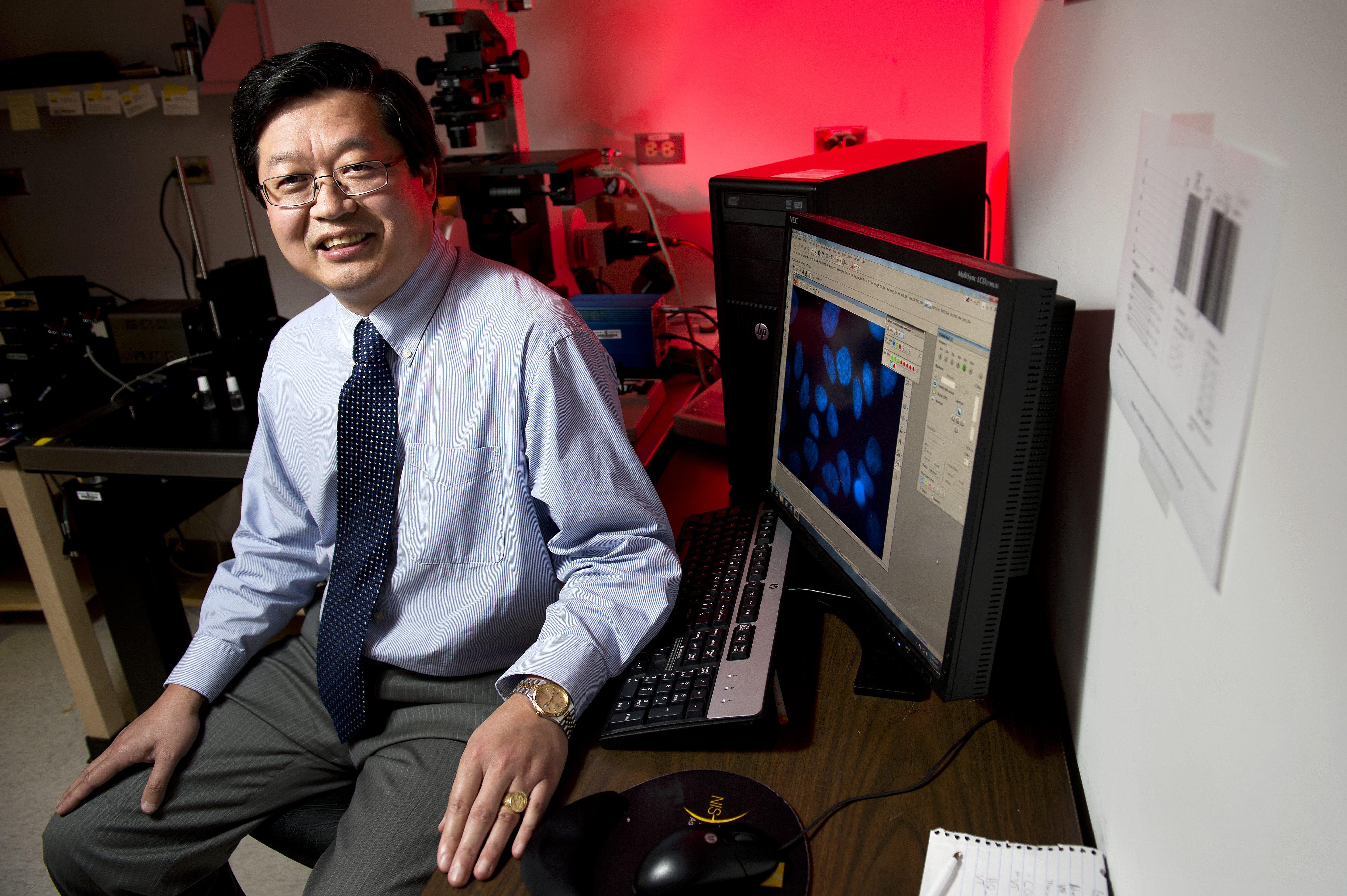Veterinary college's X.J. Meng honored as University Distinguished Professor

If not for his discovery of the “fascinating world of viruses,” Dr. X.J. Meng might have been a surgeon.
Instead, he is one of those rare individuals trained both in human medicine through a medical school and animal medicine through his Ph.D. studies in a veterinary school.
Meng is a professor of molecular virology at the Virginia-Maryland Regional College of Veterinary Medicine at Virginia Tech. He has also been named a University Distinguished Professor by the Virginia Tech Board of Visitors, a rank bestowed on no more than one percent of faculty whose scholarly attainments have attracted national and international recognition. Meng is the first from the veterinary college to hold the prestigious title.
After earning his medical degree from China’s Binzhou Medical College, Meng briefly practiced medicine part-time and planned to pursue surgery as a career. That plan was derailed when he enrolled in a graduate program at the Wuhan University College of Medicine, where he conducted his first research on human viruses. After completing a master’s degree in microbiology and finding a new passion for viruses, Meng came to the United States and pursued a doctorate in immunobiology from Iowa State University’s College of Veterinary Medicine.
Viruses, especially emerging and re-emerging animal viruses, have been Meng’s obsession ever since. An emerging virus is one that has adapted and developed into a newly discovered disease, while a re-emerging virus is one has been around for some time but has recently come back in a different form or location.
Groundbreaking research
Meng’s long list of achievements includes the discovery of two new viruses and the invention of the first fully-licensed U.S. Department of Agriculture commercial vaccine against a deadly swine disease.
“I thought that the best way to utilize my training was to conduct biomedical research in the field of comparative medicine focusing on virus diseases,” said Meng, who is in the college’s Department of Biomedical Sciences and Pathobiology. “In this way, I can contribute to both human and veterinary medicine in a meaningful way.”
Many animal virus diseases are zoonotic — meaning they can transfer from animals to people — and can have significant public health implications. “The majority of human emerging virus diseases originated from animals,” Meng explained. “It is important to study animal viruses in their natural hosts before they cross the species barrier and pose a danger to humans.”
One such virus that has crossed the species barrier is hepatitis E virus. In 1997, Meng discovered swine hepatitis E virus from pigs in the United States while working as the John E. Fogarty Visiting Scientist for the National Institute of Allergy and Infectious Diseases at the National Institutes of Health. He continued to study the virus after joining the Virginia Tech faculty in 1999 and, within, two years, discovered avian hepatitis E virus from chickens in the United States.
“Not only were these viruses new to science, but they also infect across the species barrier,” Meng said. “Because of this, we were able to establish useful animal models to study an important human virus disease — in this case, hepatitis E.”
Dr. S. Ansar Ahmed, head of the Department of Biomedical Sciences and Pathobiology, noted that the discovery of these two viruses “revolutionized the way scientists and physicians think about this important human disease.”
“It is rare for a virologist to get credit for the discovery of a new virus, let alone two important new viruses in such a short period of time,” Ahmed said.
A lasting legacy
Today, Meng’s laboratory in the Center for Molecular Medicine and Infectious Diseases is considered one of the world’s leading hepatitis E virus research centers. His 14-member research team is also studying porcine circovirus type 2, porcine reproductive and respiratory syndrome virus, and torque teno sus virus — all emerging viruses causing economically important diseases in pigs.
“If we can understand how a virus causes disease, we will then be able to design better preventive and treatment strategies against these emerging viral diseases,” Meng said.
In 2006, the U.S. Department of Agriculture granted full licensure approval for a vaccine developed in Meng’s lab against porcine circovirus. The vaccine has been sold in more than 50 countries and has saved the global swine industry hundreds of millions of dollars.
Aside from his research, Meng is also passionate about teaching. He finds time to be the course leader for three graduate and veterinary courses and an instructor or guest lecturer in six others.
“I enjoy teaching because it gives me a chance to interact with the students,” he said. “They keep me motivated to learn more. That’s the reason why I still teach all of these courses.”
His legacy includes serving as the major professor for 18 graduate students and on the graduate committee for 40 other students. After working with Meng in his laboratory, students often continue their postdoctoral training at prestigious institutions such as Stanford Medical School, the National Institutes of Health, and Mt. Sinai School of Medicine. Meng’s former graduate students and postdoctoral fellows have landed faculty positions at universities ranging from the University of Georgia to India’s National Institute of Virology.
The Qingdao, China native has received a number of prestigious awards, including the 2008 Alumni Award for Research Excellence and the 2001 and 2008 Pfizer Awards for Research Excellence. He was elected a Fellow in the American Academy of Microbiology and named an honorary Diplomate of the American College of Veterinary Microbiologists. During his career, Meng has also held leadership positions on many international and national committees and on numerous committees at Virginia Tech.
“Dr. Meng has a superb analytical mind and is a highly creative individual with global impact,” said Dr. Gerhardt Schurig, dean of the veterinary college. “Virginia Tech is lucky to have him.”
This article was written by Michael Sutphin.







